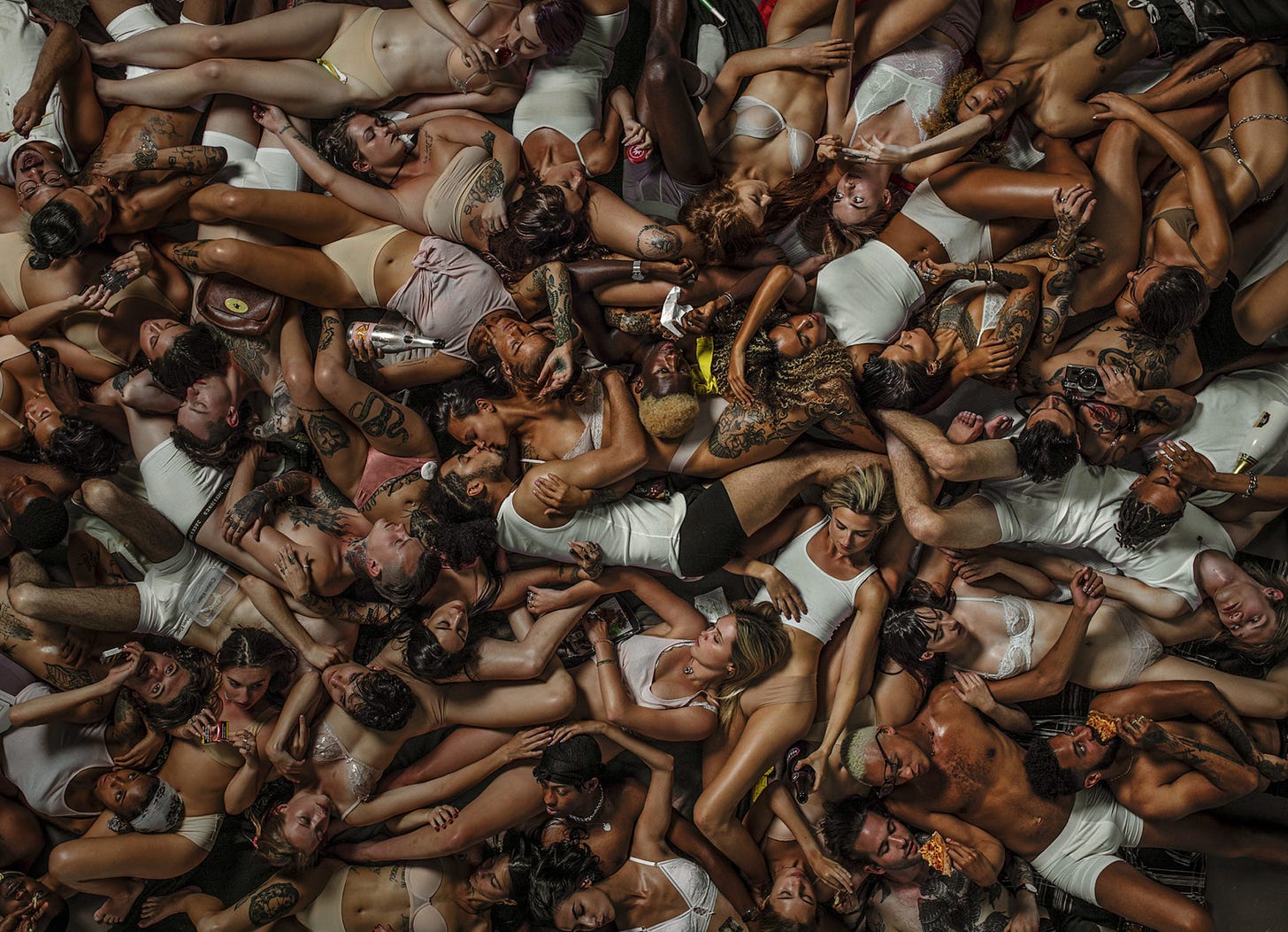I have observed these patterns for the last 15 years and interviewed hundreds of successful creatives who, I’ve noticed, have all had these three elements present.
1. A good product
If you make good work, everything will be easier. I live by the mantra ‘be so good they can’t ignore you’.
See also; ‘be undeniable’.
If you make amazing work that makes people *feel* something, they’ll tell people about it. When they do, your career will organically grow.
Someone like Cal Newport for example, has zero social media presence but is a multiple New York Times Bestseller. His writing is so good that people talk about it, share it and do most of the work of promoting, for him.
Haris Nukem posts infrequently on social media. He doesn’t worry about algorithms. When Haris has a show, his work sells out.
Good work is often the backbone of a successful career but It’s not essential. We all know some bad artists who are killing it and it can be hard to understand why…
They may know the right people, they may be lucky and they are very likely over-indexing on the other two points in this list.
However, I wouldn’t recommend building a house on crappy foundations, eventually it’ll fall down.
It’s time to look at your work and honestly assess whether it’s of a high standard. If it isn’t, you must continue to practice and improve. If you love what you do and continue learning, improvement is inevitable.
And that’s the secret hack I wish I’d learnt at school – if you like something, do it a bunch and you’ll get really good at it.
A good product comes with practice and determination. When I was a bad painter (and I was a very bad painter) no one wanted to buy my work. Through relentless practice, I learnt from my mistakes and improved. I’m now ‘oversubscribed’.
When you become a good painter or writer or singer or designer, people will start to tell you that they like your work. After a while they’ll ask to give you money for something you do. This is the first sign that you have a good product, everything gets easier from here.
2. Sales and marketing
The unfortunate truth is that a creative *career* means commerce.
Often, your creative skill is something you’ve been working on since you were a child. Sales and marketing, for most, is a new skill that must be studied and learnt.
Many creatives, however, don’t want to learn. They think ‘selling’ is a murky business and it can be… but you’re not here to trick anyone into buying from you.
I’ll always remember when I interviewed Marie Forleo, she said; “If you don’t share your creative skill with the world, you’re stealing from people”.
The first hurdle is realising that your work has value. This might take some therapy.
Then, simply learn how to present your work in its best light and to communicate that it’s available to those who are interested.
If the sales and marketing label bothers you, rename it to ‘relationships’. Everything comes down to people. Wherever you want to be in life, there is a person on the planet who can facilitate it. You probably haven’t met them and you might not be on the right rung of the ladder to meet them, YET.
The more art you make and the better you become at talking about it, the more it will start to find the audience it is meant for.
There are countless books on the nuances of sales and marketing. My favourite is ‘This is Marketing’ by Seth Godin. I’ve interviewed Seth on my podcast and can confidently credit a large amount of my success to his teachings.
Rick Rubin can teach you how to make it.
Seth Godin can teach you how to sell it
3. Time
They’ll tell you “If you want success, you have to go all in”
They don’t mention that you’ll have to do it, while juggling the rest of your life.
To successfully launch a creative career, you’ll need time. A lot of it.
You have to find the time from somewhere, so other stuff has got to go.
I saw my friends less and less as I was starting out and as a result my circle now is pretty small. Not everyone is going to respect your choice to hang out less. Most real friends will understand that you have to do this but for some people, time spent is non-negotiable.
We have to respect that, I’ll be honest though, It isn’t easy.
If you have a partner, they’re going to have to have your back or it won’t work out. Fewer date nights, less money and you’ll be distracted, often. Open communication is so important. Let them know what you’re doing, why you’re doing it and realise that the smaller sacrifices are to build the bigger picture.
If you don’t have kids and you still think that you don’t have time, I don’t know what to tell you. I know some incredible creators, who have creative careers as well as young families -
and spring to mind.They’ll tell you, it isn’t easy and it is a lot of work but it is possible.
If you’re working full or part time, which most people are, you’ll need to free up your evenings and weekends. Get up an hour early or stay up later. Work on your commute and during your lunch break. You can call it ‘hustle culture’ if you want, but sadly there is no way around it; your garden won’t grow if you don’t spend time tending it.
Your new socials won’t gain momentum if you don’t post consistently. Your podcast will languish if you post an episode every couple of weeks. Your newsletter subscribers will unsubscribe if they’ve forgotten who you are by the time they get an email.
The Netflix sessions, video gaming, fiction reading, movie visits, Lego building and any other hobbies, are probably the easiest to cut out. Relationships, life responsibilities and work that pays the rent are harder to negotiate.
Life is all about balance but for a few years the scales will be firmly leaning one way. You can build a creative career while still enjoying life, but not without sacrifice because the time has to come from somewhere.
It sounds daunting, but it isn’t forever. Most creatives I’ve spoken to say three to five years is the magic timeframe when you’ll notice things starting to shift. Maintaining a career is still tough but nothing compared to starting one.
I failed physics, but I do (vaguely) remember the lesson of putting energy into an object and as a result the energy must go somewhere. If you didn’t fail physics, you’re probably screaming that I’ve said it wrong, but you get the idea. If you put energy into something, something has to happen.
At first, you won’t see anything and that can be so demoralising but think about bamboo.
Bamboo grows underground for five years, then it shoots out of the ground and grows 30m in six weeks.
Most people quit, because they think three years is too long to be ‘underground’. It’s a long time, but not in relation to an entire lifetime.
Become a great writer, painter, photographer or speaker. Learn how to talk about what you do. Work consistently for three to five years. Change your entire life.








I needed this today! Thanks David.
It is absolutely possible! But it does come with a sacrifice—usually your time. However, there's a way to work smart, not hard. My tip is, once you're in a creative flow, implement systems and automate the sh*t out of your business. Ask for help, don't try doing it on your own - childcare is EVERYTHING. If you can't afford nursery, find a nanny service or arrange childcare swaps with a friend or someone you trust. Also, work to your energy levels, I'm a night owl so I wait until the evening to do anything creative, If I try in the day I just get creative block. Thanks for the mention, David. LOVE this.